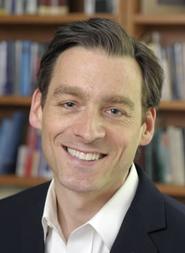
“With the backdrop of the Occupy Wall Street Protests, it’s not as hard to draw people into a discussion of inequality,” said Jacob Hacker in his lecture on Nov. 14. He brought up the protests to frame his argument: American citizens are beginning to see, as he believes they should, that the slow-moving economy alone is not the cause of middle class and working class troubles. “This isn’t just about the state of our economy, but about a sense that our democracy isn’t working well,” Hacker explained.
Hacker, the Stanley B. Resor Professor of Political Science at Yale University and director of the Institution for Social and Policy Studies, gave a lecture for the Levitt Center’s Inequality and Equity Series. The lecture was titled after his recent book, Winner-Take-All Politics: How Washington Made the Rich Richer and Turned Its Back on the Middle Class, co-authored with University of California at Berkeley professor Paul Pierson. The book delves into specific policies enacted by American presidents and Congresses across party lines and how these policies have contributed to the widening gap between the wealthiest citizens and other Americans.
“We don’t think of democracy as being good at everything, but we think it should be good at responding to the needs of the majority of Americans,” Hacker declared. He began his presentation with a focus on the statistics that show how far inequality has intensified, to the detriment of the majority of Americans. Congressional Budget Office reports in 1979 and 2007 reveal a 281 percent increase in the income of the top 1 percent of Americans, after taxes and both public and private benefits. Meanwhile, the after-tax income of the middle fifth of Americans has increased only 25 percent.
Hacker notes that these changes demand a shift in the perspectives of scholars studying inequality, who tend to focus on the economic situations of the have-nots more than the haves. He contends that everyone must begin to pay more attention to the policies that affect “the very top.” He called attention to the tax rate, which has declined significantly in progressivity over the past 30 years. Hacker warned the audience not to ignore the government’s influence over markets as well. “There’s a tendency to think, well, if it happens in the market, the government must have nothing to do with it,” he said. In fact, government deregulation has had a strong impact on the market.
Hacker emphasized the roles of both parties in the enaction of policies that have led to inequality. It was under President Carter, with a Democratic Congress, that the capital gains tax was cut, the effort to equalize minimum wage with inflation was rejected, and the creation of a consumer protection bureau was defeated. Hacker attributes this to the increasing organizational power of the business world, which began to flex its muscles in the late 1970s. Lobbying grew as a practice. “Basically, what happened is the political ecosystem as a whole changed, and both parties had to adapt,” said Hacker.
Following his lecture Hacker took questions from the audience. One attendee expressed concern that the Occupy Wall Street protests have not formed demands based on their complaints and asked Hacker what he believes their program should be. Hacker first acknowledged that it has been a problem that Occupy Wall Street protesters have not formed a widespread vision of the future, but went on to state, “I don’t think we should underestimate the effect that correctly stated grievances can have.” The viral effect of the Occupy Wall Street protests, he believes, has made inequality a central topic of American discussion.
As for specific policies that should be at the top of OWS protesters’ lists, Hacker suggests a more progressive tax code, stricter regulation of financial markets, “maybe” a financial transaction tax, and better healthcare benefits. Beyond that, however, Hacker wants to see a focus on making American government accountable to the majority of its citizens. He implores American citizens to build civic organizations to exert their influence and help to rebuild our system of checks and balances. “We are losing our democracy,” Hacker said.
Despite the still-widening income and wealth gaps, Hacker believes the situation can be turned around. He doubts the idea that the majority of Americans are satisfied with the gap, citing recent polls and the climbing support for Occupy Wall Street. Polls also show a deeply declining faith in the power of government to change the country’s economic situation. Hacker argued, “It’s much more public cynicism than public conservatism.”
“I think that our story, hard as it may be to believe, is an optimistic one,” Hacker said. Apart from changes in policy, one of the goals of the rising social movement must be to instill in voters a sense of trust in the government. Only then will Americans raise their voices for whatever cause they may choose.
